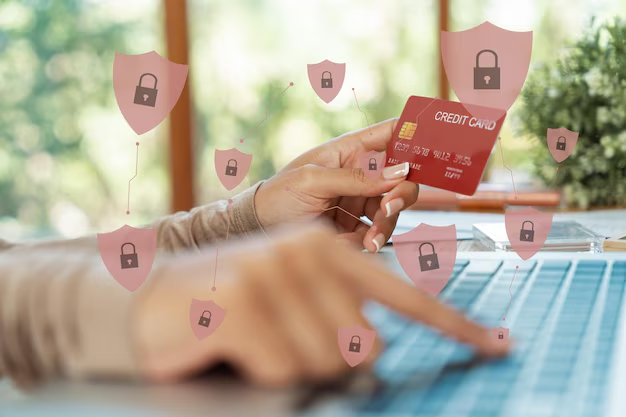Mastering Safe Credit Card Usage for Online Shopping: Your Ultimate Guide
In today's digital age, online shopping has become an integral part of our lives. From convenience to variety, the advantages are numerous, but so are the risks. Ensuring safe credit card usage in this virtual marketplace is crucial. Let's journey through everything you need to know about protecting your financial information while enjoying the benefits of online shopping.
Understanding the Risks of Online Shopping
When it comes to online shopping, convenience often comes with potential hazards. Fraud and identity theft are key concerns for digital shoppers. Recognizing these threats is the first step to safeguarding your finances.
Common Threats Faced in Online Transactions
- Phishing Scams: Fraudsters often impersonate legitimate organizations to steal your information.
- Data Breaches: Personal data can be compromised from both well-known companies and smaller websites.
- Fake Websites: These mimic real sites to capture your financial data.
- Malware and Viruses: Malicious software can be downloaded, especially from untrusted sites, which can track and steal your details.
How to Identify and Avoid Scams
- Verify URLs: Ensure the site begins with "https" which indicates a secure connection.
- Look for Trust Seals: Be cautious with websites that don’t have security certifications.
- Be Skeptical of Unsolicited Emails: Avoid clicking on links or downloading attachments from unknown sources.
Essential Tips for Safe Credit Card Usage
Navigating the world of online shopping requires vigilance. Implement these strategies to maintain your financial security.
Choose Strong Passwords and Practice Safe Browsing
- Create Unique Passwords: Use a mix of letters, numbers, and symbols.
- Regularly Update Passwords: Changing passwords periodically can ward off hackers.
- Use Secure Connections: Avoid public Wi-Fi for transactions; instead, use secure home or mobile networks.
Embrace Two-Factor Authentication (2FA)
Two-factor authentication adds an additional layer of security by requiring two forms of verification before accessing your account. This process reduces the likelihood of unauthorized access even if your password is compromised.
Regularly Monitor Your Statements
Reviewing your credit card statements frequently helps catch unauthorized transactions early. Modern banking apps can send alerts for each transaction, allowing for real-time monitoring.
Selecting the Right Credit Card for Online Shopping
Just as not all websites are created equal, neither are credit cards. Some offer superior protections and features that cater to online shoppers.
Features to Look For in a Credit Card
- Fraud Protection: Ensure the card issuer offers zero-liability fraud protection.
- Purchase Protection: Some cards refund you if your purchases are lost or damaged.
- Virtual Credit Card Numbers: These allow you to use a temporary number for a one-time purchase, reducing the risk of your real number being exposed.
Utilizing Virtual Wallets and Payment Services
Consider using virtual wallets like Apple Pay, Google Wallet, or PayPal. These services encrypt your payment information, offering a layer of protection by not sharing your card details with sellers.
Benefits of Virtual Wallets
- Anonymity: Sellers receive payment through the wallet, not your card details.
- Convenience: They streamline the checkout process.
- Security: Additional layers like password or biometric verification increase security.
Protecting Your Information Beyond the Checkout
Managing safe credit card usage goes beyond the point of sale. Developing ongoing habits can reduce risks significantly.
Secure Your Devices
- Install Anti-virus Software: Prevent malware from compromising your data.
- Keep Software Updated: Regular updates patch security vulnerabilities.
- Encrypt Sensitive Information: Some devices offer encryption tools; take advantage of them.
Exercise Caution with Shared Devices
Avoid entering sensitive information on shared devices, which can potentially store your data without your knowledge.
How to Respond to Credit Card Fraud and Unauthorized Transactions
Even with precautions, you may fall victim to credit card fraud. Knowing what steps to take can minimize damage.
Immediate Actions if Your Credit Card is Compromised
- Contact Your Bank or Card Issuer Immediately: Report any suspicious transactions to freeze the account.
- Check for Further Unauthorized Transactions: Review past statements for other discrepancies.
- File a Police Report: This may be necessary for insurance and report filings.
Leverage Credit Monitoring Services
These services can alert you to suspicious activities on your credit report, offering peace of mind and a proactive approach to your financial health.
Practical Tips and Takeaways
Here's a quick guide to ensure you're staying safe while shopping online:
- 🔒 Always Shop on Secure Websites: Look for "https" and trust seals.
- 🛡️ Use Virtual Wallets: These enhance privacy.
- 🔔 Set Up Alerts: Keep abreast of all transactions.
- 💳 Choose Cards with Fraud Protection: Ensures peace of mind.
- 🔄 Change Passwords Regularly: Enhance account security.
Conclusion: Embrace the Digital Marketplace with Confidence
Armed with knowledge and the right tools, you can shop online securely. Understanding the risks, using the right credit card features, and following safety tips will empower you to enjoy the conveniences of online shopping without compromising your financial safety. Stay vigilant, stay protected, and enjoy the vast world of online marketplaces.

Related Topics
- A Beginners Guide To Investing In Gold And Other Precious Metals On a Budget
- A Comprehensive Guide To Bridge Loans: How They Can Be Helpful For Lower Income Americans
- A Comprehensive Guide: Growth Stocks Versus Value Stocks
- A Comprehensive Guide: The Impact Of Bankruptcy On Homeownership And Mortgage Options
- A Guide For Lower-Income Americans: Making Your Savings Last A Lifetime
- A Guide: Understanding Different Types Of Bank Accounts
- A Guided Journey: Applying For a Mortgage Through Your Bank
- A Helping Hand: Government Assistance Programs For First-Time Home Buyers
- A Practical Guide: Understanding And Reducing Your Property Tax Assessment
- A Simple Guide To Rent-to-Own Home Contracts For Lower-Income Americans
